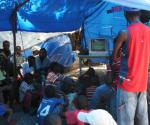Building a More Resilient Haitian State
 The RAND Corportation has produced a report that convincingly argues building the Haitian state should be central to reconstruction efforts. This includes the development of skilled, trained, and properly organized government personnel and management systems within and across Ministries. The report suggests that, at least through the medium term, the Haitian government should contract out health and education services, monitoring and regulating but providing no direct services itself. It also notes the importance of developing the capacity and accountability of the Haitian National Police. A summary is copied below and the full report is attached.
The RAND Corportation has produced a report that convincingly argues building the Haitian state should be central to reconstruction efforts. This includes the development of skilled, trained, and properly organized government personnel and management systems within and across Ministries. The report suggests that, at least through the medium term, the Haitian government should contract out health and education services, monitoring and regulating but providing no direct services itself. It also notes the importance of developing the capacity and accountability of the Haitian National Police. A summary is copied below and the full report is attached.











